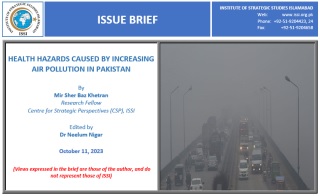Background
The air quality in Pakistan’s major urban centres has considerably deteriorated over the past five years. Lahore and other cities regularly feature in the list of the most polluted cities globally. Air pollution in Pakistan is a significant environmental and public health concern. Several factors contribute to air pollution in the country, including industrial emissions, vehicular emissions, agricultural activities, and natural sources such as dust storms. Pakistan has witnessed the worst air pollution in recent years from Karachi to Lahore, as a mixture of low-grade diesel fumes, smoke from seasonal crop burn-off, and colder winter temperatures meld into stagnant clouds of smog.
According to a report published by the University of Chicago’s Energy Policy Institute (EPIC) in its latest Air Quality Life Index (AQLI), air pollution cuts life expectancy by nearly 4 years in Pakistan.[1] Increasing air pollution in Pakistan may shorten life expectancy by at least seven years in the country’s most polluted regions like Lahore, Sheikhupura, Kasur, and Peshawar.
















